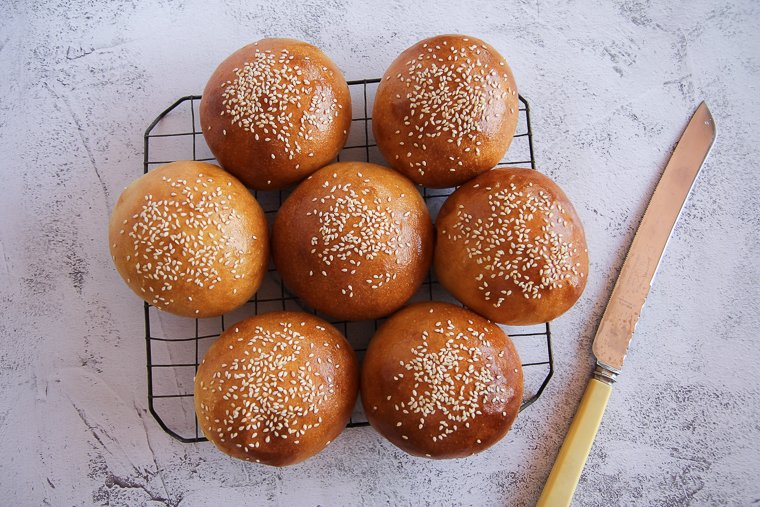
This post may contain affiliate links. See my full disclosure. As an Amazon Associate, I earn from qualifying purchases.
Learn to make the best sourdough hamburger buns! The recipe utilizes a scalded flour mixture (yundane) for a soft and light texture and some whole wheat flour for added nutrition and flavor. Prepare the yundane and starter the night before, and make the buns in one day!
*Updated 2/22/24

Instead of buying burger buns, you can make homemade buns without yeast using a sourdough starter and simple ingredients!
I like to use my sourdough starter to make many of our bread products including sourdough pizza crust, sourdough bagels, and sourdough English muffins.
Find 100% whole wheat sourdough hamburger buns here.
Some homemade hamburger buns err on the side of being heavy and filling. I prefer this sourdough hamburger bun recipe.
These sourdough buns come out with such a soft, light texture even though a portion of the flour is wholegrain.
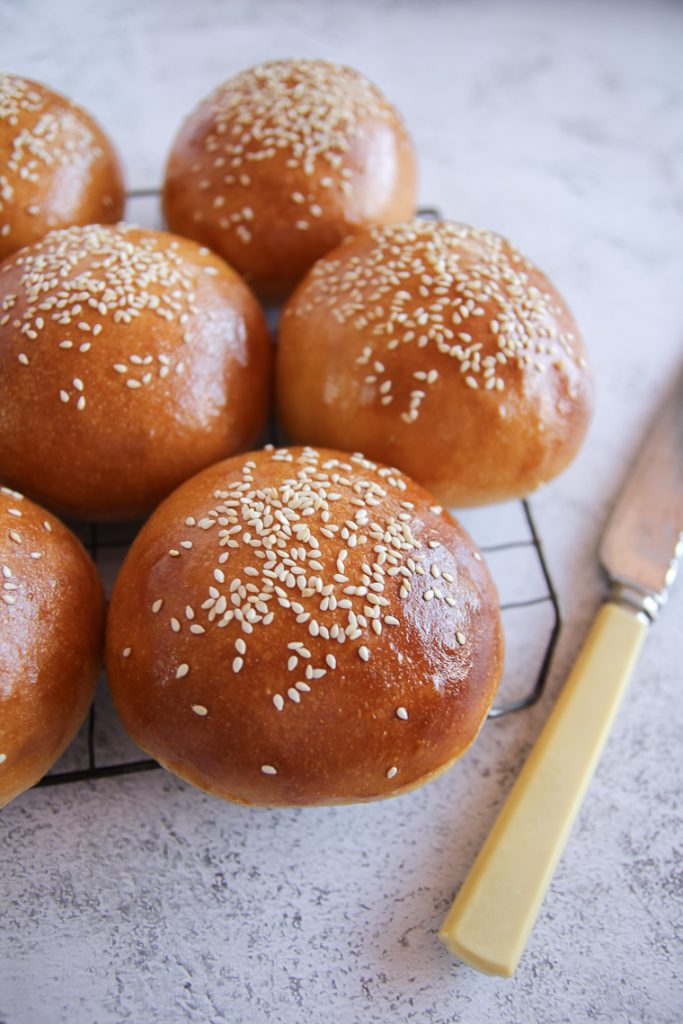
They are delicious toasted for a juicy grilled burger or pulled pork sandwich. (The recipe is perfect for hotdog buns too, by the way).
Although they are wonderful served right after they are baked, I think they are even better the second day when the outsides of the buns have softened!
*If you want an even more buttery sourdough burger bun, use my sourdough brioche recipe and find instructions for making brioche buns in Step 4.
What is yundane?
Yundane is a scalded flour mixture.
It sounds complicated, but to make it, all you have to do is stir boiling water and flour together into a paste. It will rest in the fridge overnight as the flour gelatinizes.
The yundane improves the final dough by allowing the dough to soak in more water. This creates softer sourdough burger buns that stay fresh on the counter longer than homemade buns normally would.
Notes About the Flours Used
This recipe calls for about 40% whole wheat flour. I mill my own hard white wheat berries.
Hard white wheat is still a wholegrain, but it has a lighter color and more mild flavor than traditional red wheat. I like those characteristics for sourdough hamburger buns.
You could purchase hard white wheat flour if you don’t mill your own, or use regular whole wheat flour.
You can also replace the whole wheat flour with more all-purpose flour if that’s all you have on hand. Just hold back some of the milk.
Sourdough Hamburger Buns Baking Schedule
*The temperature of your dough and kitchen will affect how long each step will take. I bulk fermented and proofed around 75°F with a final dough temp of 75°F. If your kitchen is cooler, expect the dough to rise slower.
Approximate timing:
- Prepare yundane and starter: 5 minutes the night before
- Mix and knead dough (including 30 minute rest): 40 minutes
- Warm bulk rise: 2.75 hours
- Divide and shape: 15 minutes
- Proof: 4 hours
- Bake: 14 minutes
Make your prepared starter and yundane before bed so you can start the dough the next morning. The process took me about 8 hours total on day 2.
Tips for Making Sourdough Hamburger Buns
- The yundane needs to sit overnight for the starch in the flour to gelatinize. It will not function the same way if made the same morning the dough is mixed.
- The prepared starter should have risen to triple its size and be very bubbly throughout when it’s time to mix the dough the next morning. Give it extra time if it needs it.
- Two keys to the perfect soft and light texture are kneading to a dramatic windowpane and pushing the proof. The dough should be quite sticky before the kneading is done. When you shape the sourdough burger buns, they will look so small! They will increase in size during the second rise.
- This makes 10 standard-size burger buns that work well for hamburgers made from a quarter-pound of ground beef. If you want even larger sourdough buns, make only 8 buns (87g each) out of the recipe. You can also make small sourdough slider buns by forming 20 buns (35g each) with the same amount of dough.
- If you want to make a double batch but don’t have extra oven space, you can bake up to 12 buns on a single half sheet pan. They will touch slightly when baking, but that’s okay.
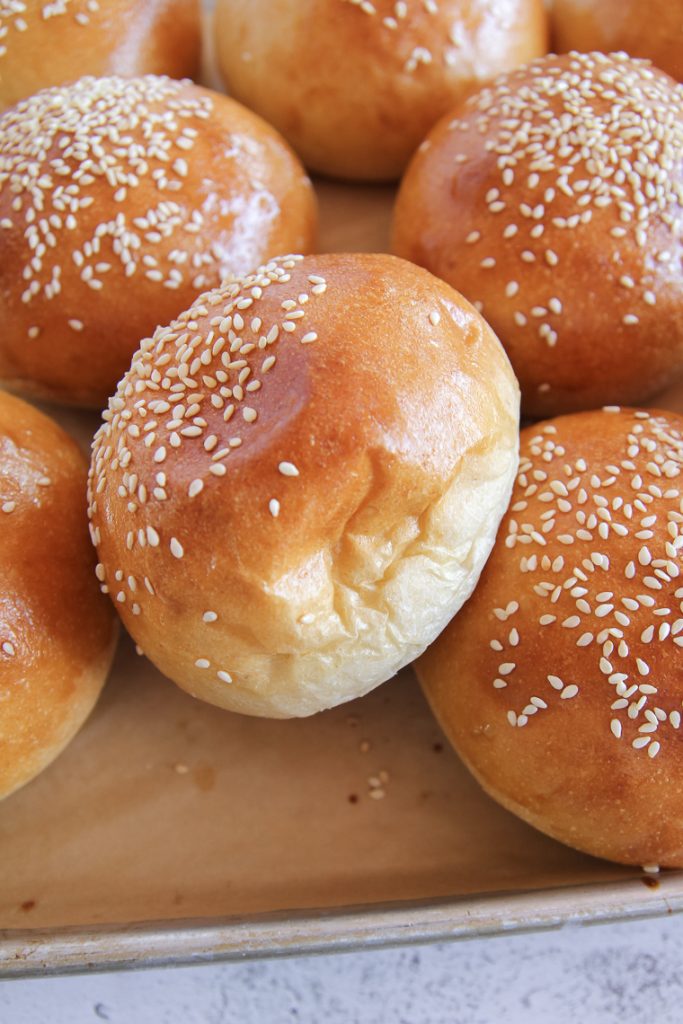
Recommended Equipment
- Digital kitchen scale (this one is my favorite)
- Bosch Universal Plus Mixer (or stand mixer)
- Flexible dough scraper
- Bench scraper
- Termapen ONE instant-read thermometer (my favorite brand of thermometers for accuracy)
- Thermapen SPOT ambient thermometer
- Parchment paper
- Half-sheet pans
- Pastry brush
- Cooling rack
How to Make The Best Sourdough Hamburger Buns
Step 1 – Prepare Starter and Yundane (Night Before)
It’s pretty quick to prepare the starter and yundane.
It’s just a matter of stirring together the ingredients in their respective containers. Cover both. Leave the starter out at room temperature to ripen, and place the yundane in the fridge until morning.
In the morning, the starter should have tripled in size and look very bubbly all the way to the top before you start your dough.
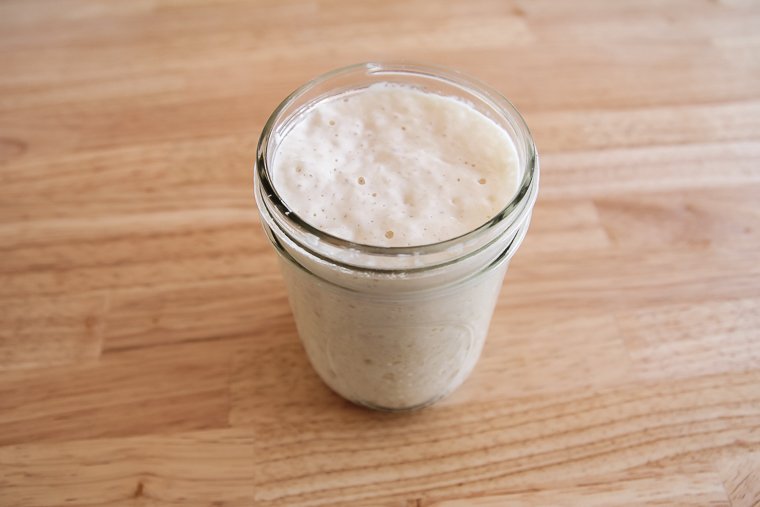
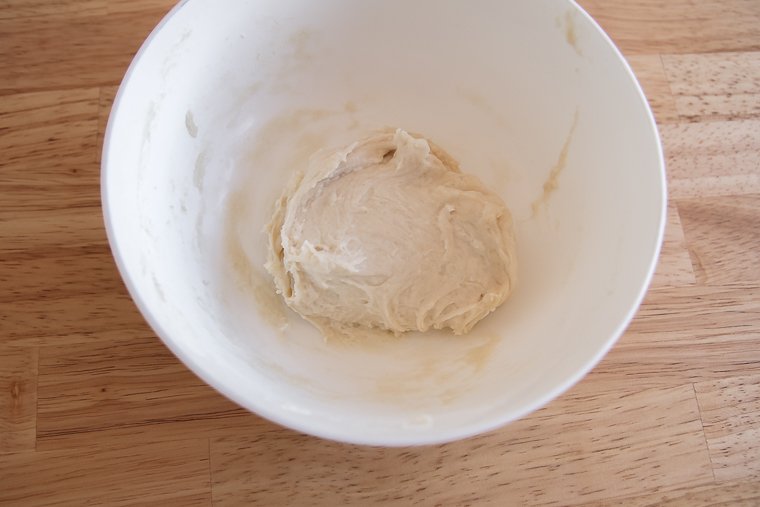
Step 2 – Mix and Knead Sourdough Hamburger Bun Dough
I use my Bosch mixer fitted with the dough hook and the dough hook extender.
Any stand mixer will do, or you can slap-and-fold and knead the dough by hand on the counter if you don’t have a mixer.
Add the prepared starter and yundane to the other dough ingredients, holding back the salt and butter. Those will go in after the dough rests for 30 minutes.
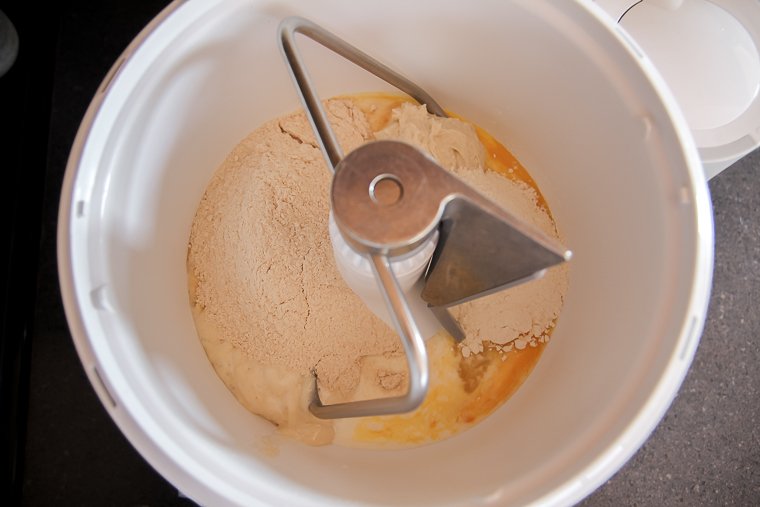
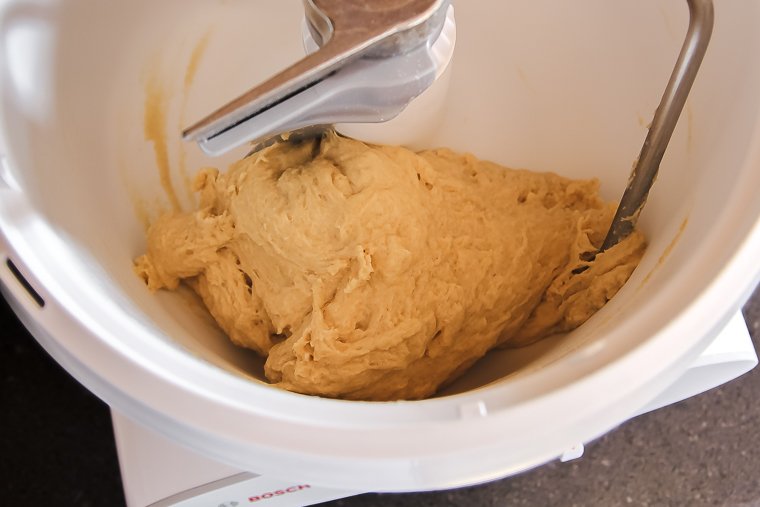
Knead the dough until it becomes very smooth and shiny and can be stretched to a thin windowpane with damp fingers.
You’ll notice the dough will clean itself off the mixer bowl and become less sticky when it has reached this point.
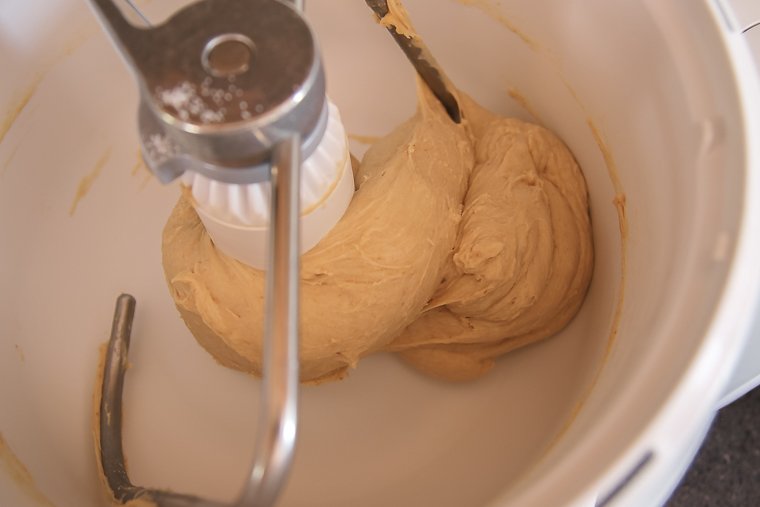
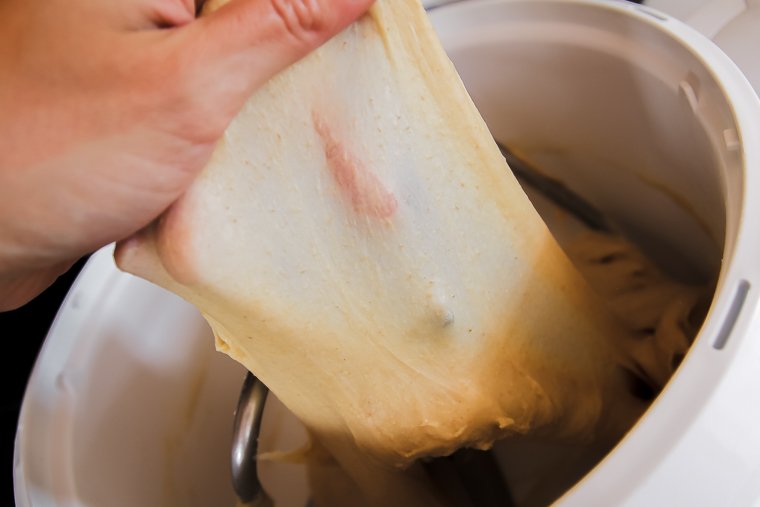
Step 3 – Bulk Ferment Sourdough Burger Dough
When the dough is finished, form it into a tidy ball on a clean countertop with a dampened bench knife. Place it in a bowl, and cover it with plastic wrap.
Allow it to bulk ferment until it has doubled in size.
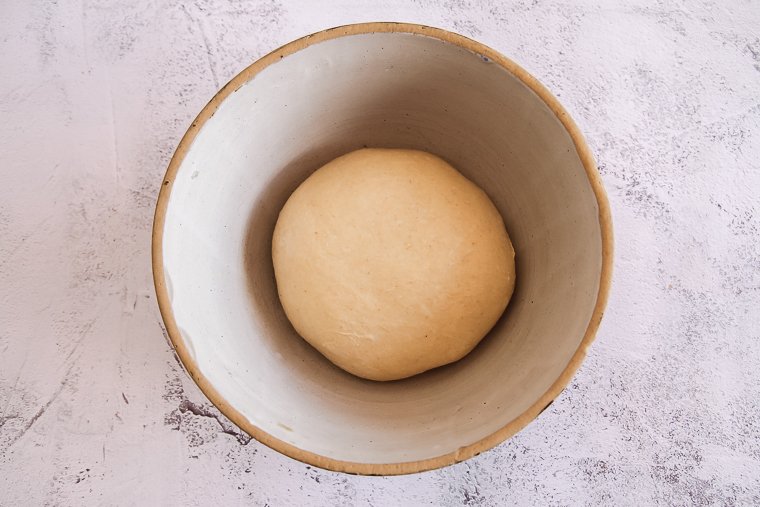
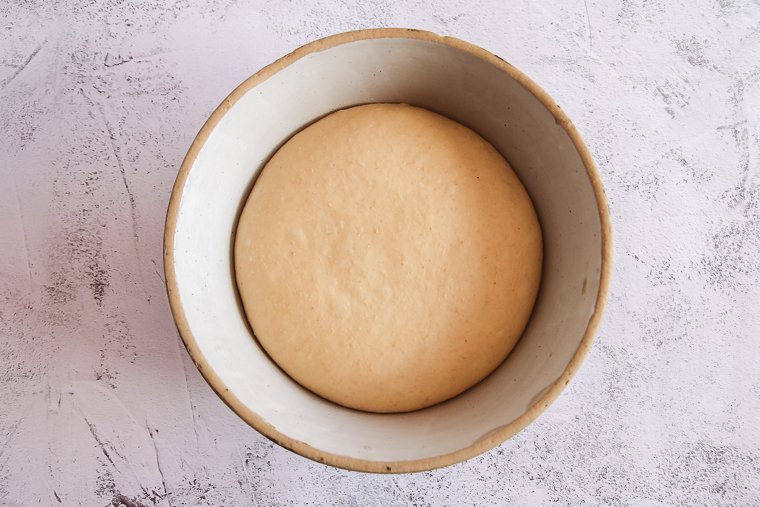
Step 4 – Divide and Shape Sourdough Burger Buns
Then it’s time to turn out the sourdough hamburger bun dough, and use your bench knife again to divide it into 10 pieces that are 70 grams apiece.
To shape the sourdough buns, start by degassing the first piece of dough. You’re basically pressing it flat to remove any bubbles.
Then use your fingers to begin forming it into the shape of a ball.
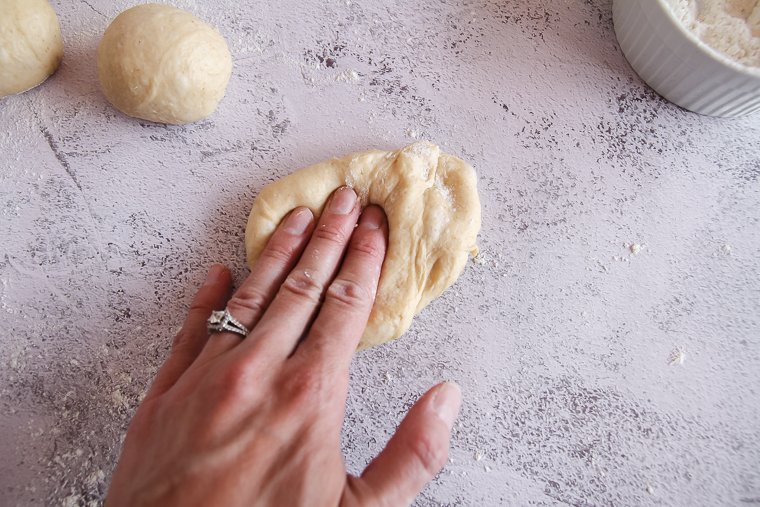
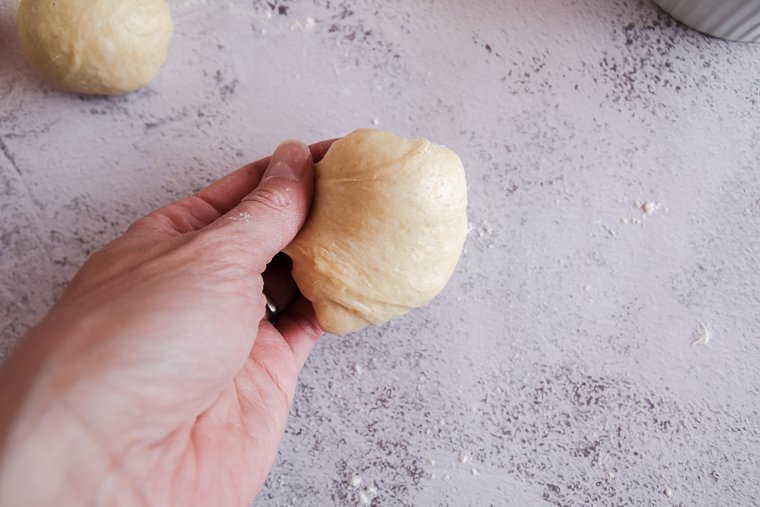
Next cup your hand around the dough ball and scoot it in a circular motion against the countertop to make a tight, smooth bun.
Use a light dusting of flour on your hands as needed to prevent sticking, but not much! The dough needs to grip the counter a little for the scooting to work.
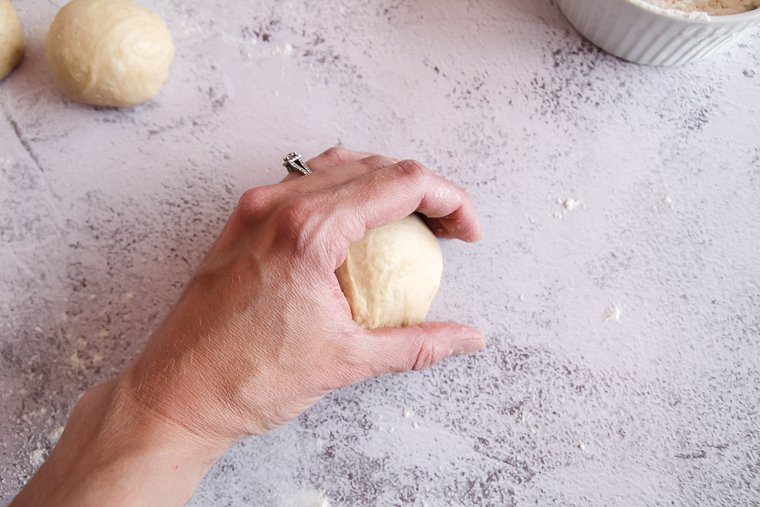
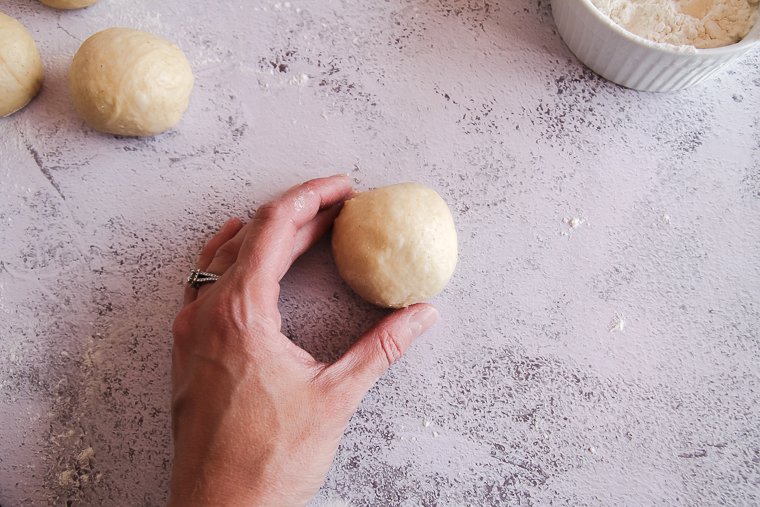
Repeat with the remaining pieces of dough until they are all shaped.
Step 5 – Proof Sourdough Hamburger Buns
Prepare two half sheet pans with parchment paper. Arrange the sourdough burger buns five to each pan.
Cover loosely with plastic wrap so the hamburger buns don’t dry out, and leave them to proof until they have more than doubled in size.
When they are done proofing, they should look very poofy and jiggle slightly when the pan is pushed.
Make sure they get to the proper size here, or you’ll end up with small, dense buns.
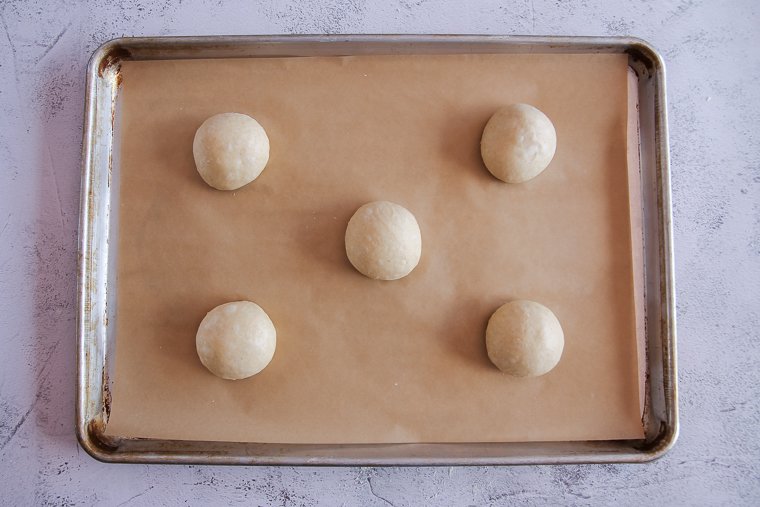
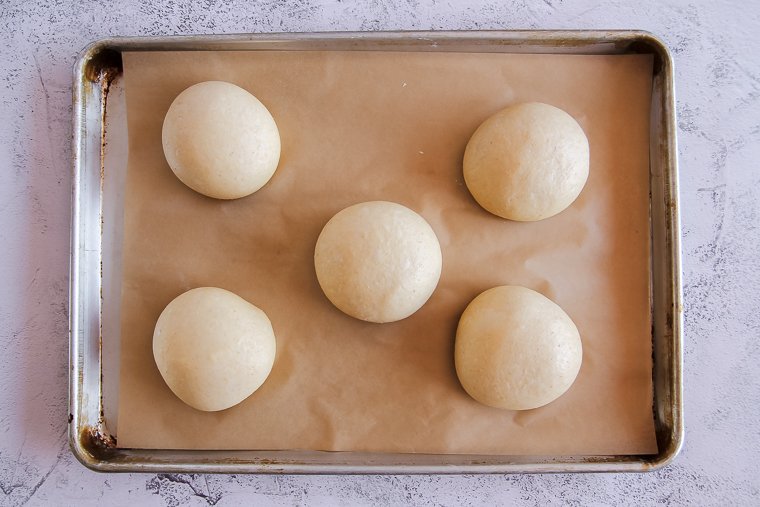
Meanwhile, preheat your oven to 425°F with two racks arranged in the center.
Step 6 – Apply Egg Wash, Toppings, and Bake
Right before they go into the oven, brush on a layer of egg wash with a pastry brush to give them color and shine as they bake. Be gentle, or the buns could collapse.
Sprinkle on toppings, if you like. We’ve done these buns with white sesame seeds, black sesame seeds, or Everything Bagel Seasoning.
Bake them for 10 minutes, then rotate the pans to promote even browning. Finally, bake for about 4 more minutes, or until they are golden.
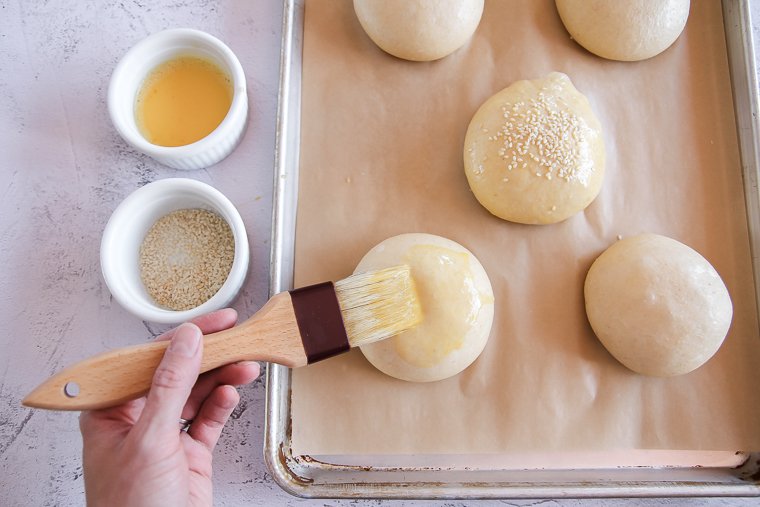
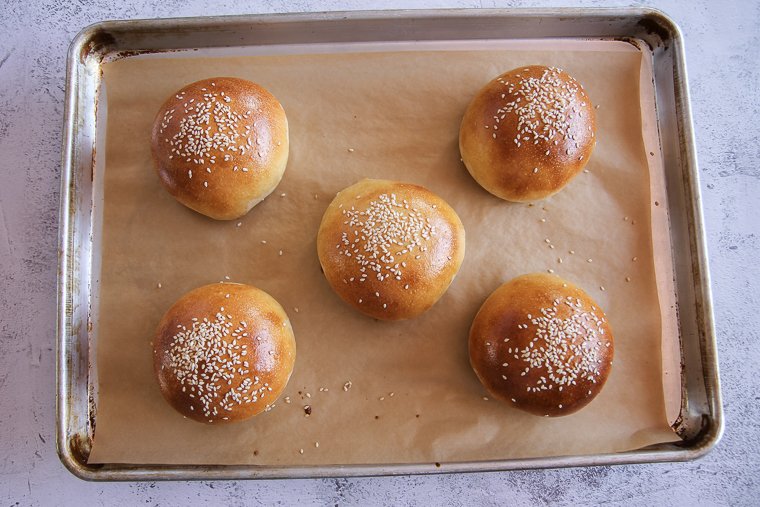
Transfer them to a cooling rack and allow them to cool completely before you slice or store them. Consume within 3 days if you store them at room temperature.
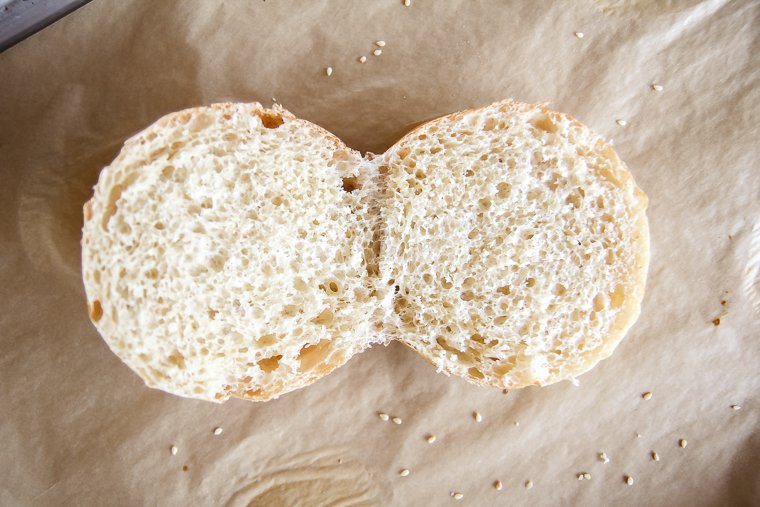
Can You Freeze Sourdough Hamburger Buns?
Sourdough hamburger buns freeze very well! I like to arrange them in a double layer (like store-bought buns are packaged) in a freezer zipper bag (or bread bag). Freeze for up to three months.
Pull them back out ahead of time to thaw at room temperature, or microwave them briefly if you’re in a hurry.
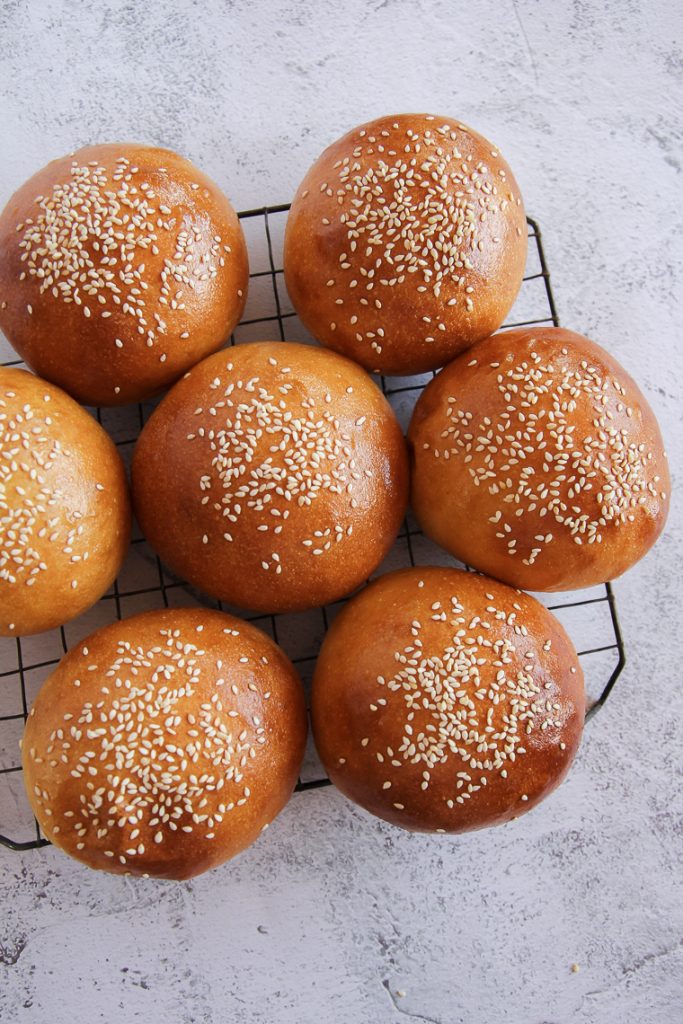
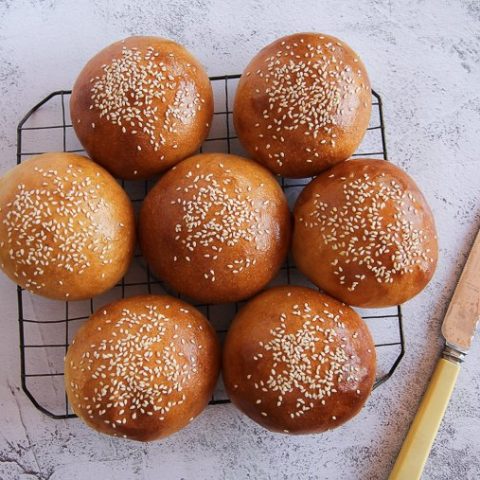
The Best Sourdough Hamburger Buns
These are the best sourdough hamburger buns! The recipe utilizes a scalded flour mixture (yundane) for a soft and light texture, and some whole wheat flour for added nutrition and flavor. Prepare the yundane and starter the night before, and make the buns in one day!
Ingredients
Prepared Starter (Night Before)
- 51g ripe sourdough starter (100% hydration)
- 58g water
- 24g granulated sugar
- 58g unbleached all-purpose flour (my flour is 11.5% protein)
Yundane (Night Before)
- 67g unbleached all-purpose flour
- 67g boiling water
Final Dough (Next Morning)
- All of prepared starter (from above)
- All of yundane (from above)
- 144g whole wheat flour (I mill my own hard white whole wheat)*
- 78g unbleached all-purpose flour
- 56g egg (about 1 large egg)
- 28g granulated sugar
- 67g whole milk, warmed slightly
- 7g kosher salt
- 30g salted butter, cold, cut into small cubes
Egg Wash
- 1 egg
- 1 tablespoon milk
- Sesame seeds for topping (optional)
Instructions
- Prepare starter and yundane (night before): Mix the starter ingredients in a bowl or jar, cover, and let sit at room temperature for about 12 hours (overnight) until it has tripled in size and is very bubbly throughout. To prepare the yundane, stir together the flour and boiling water until it forms a paste and all the dry flour is absorbed. Cover and refrigerate until the next morning.
- Mix and rest (next morning): Into a stand mixer fitted with a dough hook, add prepared starter, yundane, whole wheat flour, all-purpose flour, egg, sugar, and milk. Mix on low speed until the dough comes together. Cover the dough, and allow it to rest for 30 minutes.
- Add salt and butter and knead: After 30 minutes, add the salt and cold butter cubes. Continue to knead on low speed for 6-8 more minutes until the butter has been thoroughly incorporated and the dough becomes shiny, cleans itself off the bowl of the mixer, and forms a very thin windowpane when stretched with damp fingers. (You can knead dough by hand using slap-and-folds if you don't have a mixer.)
- Bulk ferment: Form the dough into a ball, place in a bowl and cover. Set at room temperature until it doubles in volume. (The bulk rise took me 2.75 hours with a dough temp and ambient temp of 75°F, for your reference.)
- Divide and shape: Line two half sheet pans with parchment paper. Remove dough to a clean countertop and divide into 10 pieces (70g each). Degas the first piece by pressing it flat with your palm to remove any large air bubbles. Shape into a ball, then tighten the ball by scooting the dough against the surface of the counter in a circular motion with your hand cupped over the dough. Lightly flour your hands as needed to prevent sticking. Repeat to shape remaining buns.
- Proof: Arrange buns on the prepared pans, 5 to each pan. Cover loosely with plastic wrap to prevent the buns from drying out. Leave to proof until the buns have more-than doubled in size and relax outward, and slightly wobble when the pan is bumped (proofing took me 4 hours at 75°F). Meanwhile, preheat oven to 425°F with two racks arranged in the middle.
- Egg wash, top, and bake: Whisk together egg wash ingredients. Gently brush egg wash over the surface of each bun, being careful not to deflate the buns. Sprinkle on sesame seeds, if desired. Bake both pans together for 10 minutes, then rotate pans and bake for about 4 minutes longer or until buns are golden brown. Transfer buns to a cooling rack. Allow to cool completely before slicing or storing. Buns are delicious toasted, and are even better on day 2. They freeze well for up to 3 months.
Notes
*white wheat flour is a wholegrain flour, it's simply a different variety of wheat with a lighter color and more mild flavor than traditional red wheat. You can use either kind of whole wheat flour. Do not use a soft white wheat or pastry flour.
- The yundane needs to sit overnight for the starch in the flour to gelatinize. It will not function the same way if made the same morning the dough is mixed.
- The keys to the soft, light texture of these buns is kneading for the proper length of time and proofing sufficiently. Note that the dough should be quite sticky before kneading.
- This recipe makes 10 standard-size burger buns that work well for hamburgers made with 1/4lb ground beef. If you want even larger sourdough buns, make only 8 buns (87g each) out of the recipe. You can also make small sourdough slider buns by forming 20 buns (35g each) with the same amount of dough.
Recommended Products
As an Amazon Associate and member of other affiliate programs, I earn from qualifying purchases.
-
 OXO Good Grips Stainless Steel Scraper
OXO Good Grips Stainless Steel Scraper -
 Flexible Dough Scrapers
Flexible Dough Scrapers -
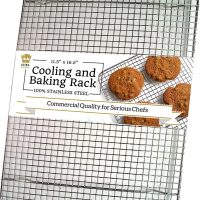 Cooling Racks
Cooling Racks -
 King Arthur, 100% Organic White Whole Wheat Flour
King Arthur, 100% Organic White Whole Wheat Flour -
 Hard White Wheat Berries
Hard White Wheat Berries -
 Pastry Brushes
Pastry Brushes -
 Nordic Ware Natural Aluminum Commercial Baker's Half Sheet (2 Pack), Silver
Nordic Ware Natural Aluminum Commercial Baker's Half Sheet (2 Pack), Silver -
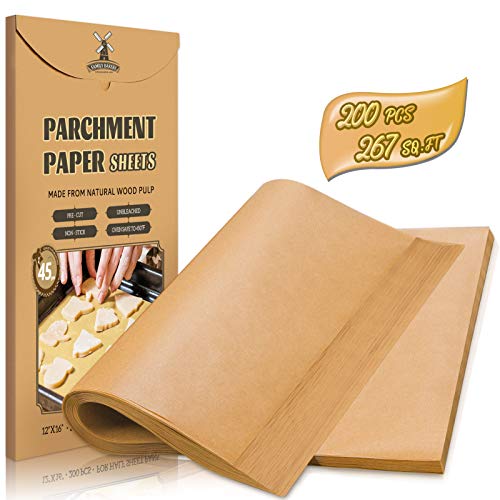 Parchment Paper Baking Sheets
Parchment Paper Baking Sheets -
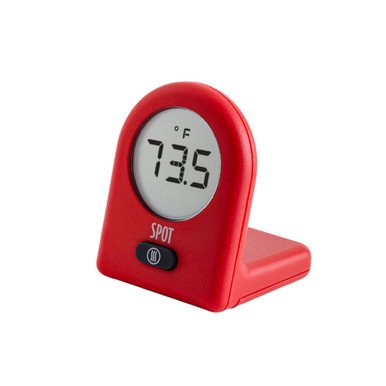 Thermoworks SPOT Ambient Thermometer
Thermoworks SPOT Ambient Thermometer -
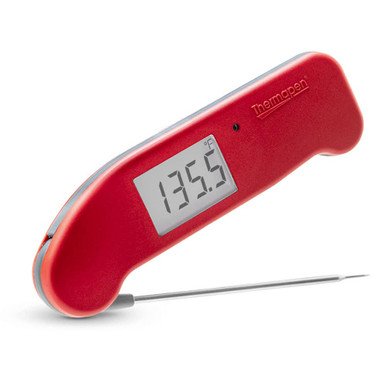 Thermapen ONE Instant Read Thermometer
Thermapen ONE Instant Read Thermometer -
 White Universal Plus
White Universal Plus -
 Bakers Math Kitchen Scale - KD8000
Bakers Math Kitchen Scale - KD8000
Nutrition Information:
Yield: 10 Serving Size: 1Amount Per Serving: Calories: 215Total Fat: 6gSaturated Fat: 2gTrans Fat: 0gUnsaturated Fat: 3gCholesterol: 48mgSodium: 347mgCarbohydrates: 34gFiber: 3gSugar: 6gProtein: 7g
*Nutrition information is not always accurate.
If you make this recipe and love it, I would be so grateful if you would come back to leave a star rating and a comment. Your feedback is very appreciated!
Follow me on Instagram @aberlehome and tag me on your photo to show me what you made!



This was exactly what I was looking for! So excited to have found your recipe! I’ve made them twice now and my family is excited to finally have a nice soft bun that doesn’t push the meat out the other side when you bite into it. They’re perfect!
I’m so glad to hear that, Lisa!
Do you think this could be made with 100% wheat. What changes would you make?
Hi Tiffany! Yes, and that’s actually on my to-do list for a blog post in the near future. I would keep the yundane and starter ratios the same even with whole wheat flour. I would also keep the flour amount the same in the main dough (222g total), but increase the milk as needed to achieve a similar dough consistency as this recipe. If you try it, I’d love your feedback. 🙂
Well gracious me I thought I proofed for spelling errors lol! I meant to say mix the sugar!
Hi Lauren! That’s a great question. The sugar balances the starter in a certain way to keep the buns from tasting sour. That’s why I make the “prepared starter” for the recipe with only 51g of my mother starter and the sugar, water, and flour. That way I’m not adding sugar to my main jar of starter. I hope that makes sense!
This looks like a lovely recipe! Question… do you mi me sugar in with your sourdough starter the night before the bake?? I’ve never heard of adding sugar!